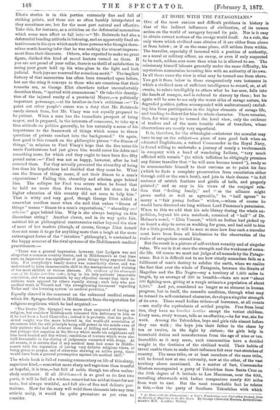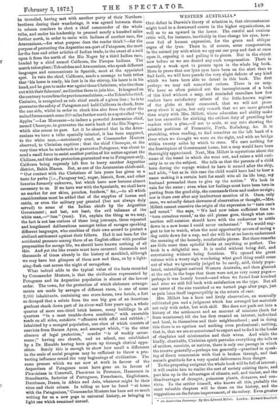AT HOME WITH THE PATAGONIANS.*
ONE of the most curious and difficult problems in history is that of the indirect influences of civilization, of its unseen action on the world of savagery beyond its pale. Nor is it easy to obtain correct notions of the savage world itself. As a rule, the only views which civilized man obtains of it are either from above or from below ; or if on the same plane, still seldom from within. The traveller, especially if invested with a position of authority, as a naval or military officer, an envoy, or even if only suspected to be such, seldom sees more than what he is allowed to see. The missionary himself labours generally under the same difficulty, his mysterious commission investing him with an authority of its own. In all these cases the view is what may be termed one from above. You get it from below in those comparatively rare instances in which a civilized man of sufficient intelligence to record, or, at all events, to relate intelligibly to others what he has seen, falls into the hands of savages, and is reduced to slavery by them ; but he again will be sure to see only the worst sides of savage nature, his degraded position (often accompanied with maltreatment) exclud- ing him from participation in the higher elements of savage life, and tending to distort for him its whole character. There remains, then, for what may ba termed the level view, only the evidence of traders and of the more humble class of travellers, whose observations are mostly very superficial.
It is, therefore, for the ethnologist—whatever the moralist may have to say on the subject—a piece of rare good luck when an educated Englishman, a retired Commander in the Royal Navy, is found willing to undertake a journey of nearly a twelvemonth in company with a band of wandering Indians, "very much afflicted with vermin" (to which infliction he obligingly promises any future traveller that "he will soon become inured "), ready so to accommodate himself to their customs as to paint his face (which he finds complete preservation from excoriation either through cold or the sun's heat), and join in their dances "in full costume of ostrich feathers and girdle of bells, and properly painted ;" and so easy in his views of the conjugal rela- tion that "feeling lonely," and " as the alliance might prove useful as well as agreeable," he "half agrees" to marry a "fair young Indian" widow, —whom of course he would have divorced ere long without Lord Penzance's permission. When to this we add that his sole library during the whole ex- pedition, beyond his own notebook, consisted of " half " of Dr. Holmes's novel, "Elsie Venner," which an Indian had picked up on board a ship to serve as wadding for guns, and had sold to him for a little powder, it will be seen at once how free such a traveller must have been from all hindrances to the observation of the realm of savagedom around him.
But the result is a picture of self-evident veracity and of singular value. We see in it at once the strength and the weakness of noma- dic life. Of course we must not judge of all nomads by the Patago- nians. But it is difficult not to see how utterly nomadism fails as a fulfilment of man's destiny to subdue the earth, when we realize the fact that over the whole of Patagonia, between the Straits of Magellan and the Rio Negro—say a territory of 1,000 miles in length, by an average of 300 in breadth—there are now "about 500 fighting men, giving at a rough estimate a population of about 3,000." And yet, considered no longer as an element in human progress, but in itself, the nomadic condition, through what may be termed its self-contained character, develops a singular strength of its own. These small Indian tribes—of horsemen, at all events —are really the equivalents of settled peoples. Free from local ties, they have no touches intetiles except the veriest children. Every man, every woman, tells as an effective,—he for war, she for work. Among the Tehuelches, boys and girls ride almost before they can walk ; the boys join their father in the chase by ten or twelve, in the fight by sixteen; the girls help in household duties and manufactures from the age of nine or ten. Incredible as it may seem, such communities have a decided weight in the destinies of the civilized world. Their habits of travel enable them to make their influence felt over vast stretches of country. The same tribe, or at least members of the same tribe, will be found now at one extremity, now at the other, of the vast territory above mentioned. As a matter of fact, Commander Musters accompanied a party of Tehuelches from Santa Cruz on the 50th degree of S. latitude to Las Manzanas, near the 40th, travelling afterwards with Indian companions nearly 400 miles from west to east. But the most remarkable fact he relates is this,—that the party of Southern Tehuelches with which • At Home with the Patagonia= : a Year's Wanderings over Untrodden Ground, from the Straits of Magellan to the Rio Negro. By George Chaworth Musters, Retired Com- mander, R.N. London: Murray. he travelled, having met with another party of their Northern brethren during their wanderings, it was agreed between them in solemn conclave to elect a chief commander of the whole tribe, and under his leadership to proceed nearly a hundred miles further north, in order to unite with Indians of another race, the Araucanians,—for what purpose does the reader think ?—for the purpose of protecting the Argentine sea-port of Patagones, the mart for the furs and other articles of Indian trade, in the event of a raid upon it from the north of the Rio Negro by a third Indian race, headed by a chief named Calficura, the Pampas Indians. The march takes place; Tehuelches and Araucanians, who speak different languages and communicate in Spanish, meet at the appointed spot. In vain the chief, Calficura, sends a message to both tribes that 'his horse is ready, his foot is in the stirrup, his lance is in his hand, and he goes to make war againt these Christians, who tire them out with their falseness', and invites them to join him. It is agreed on the contrary to confirmthe previous resolutions,—the Tehuelche chief, Casimir°, is recognized as sole chief south of a given line ; he is to guarantee the safety of Patagones and hold Calficura in check, from the one side, whilst in order to check him also from the other the united forces march some 200 miles further north to a spot called "the Apples "—Las Manzanas—to induce a powerful Araucanian chief, named Cheoeque, to guarantee the north bank of the Rio Negro,— which also comes to pass. Let it be observed that in the Aran- canians we have a tribe specially inimical, it has been supposed, to the white man,—notoriously cruel, as Commander Musters observed, to Christian captives ; that the chief Cheoeque, at the very time when he undertook to guarantee Patagones, was about to send a small force to assist another portion of his nation against the Chilians, and that the protection guaranteed was to Patagones only, Calficura being expressly left free to harry another Argentine district, Bahia Blanca. But, as one of the Aracuanian chiefs said, "Our contact with the Christians of late years has given us a taste for yerba [i.e., Paraguay tea], sugar, biscuit, flour, and other luxuries formerly unknown, but which have now become almost necessary to us. If we have war with the Spaniards, we shall have no market for our skins, pouches, feathers," &c.,—to all which considerations must be added that of the supplies of horses and cattle, or even the military pay granted (but not always duly served) to some of the Indian chiefs by the Argentine Government ; and last, not least, the evil talisman of the white man,—" lum " (rum). Yet, explain the thing as we may, the fact is not less curious of these long journeys, these repeated and lengthened deliberations amongst tribes of savages speaking different languages, who combine of their own accord to protect a civilized settlement against their fellows. Had it not been for the accidental presence among them of an English officer with peculiar propensities for savage life, we should have known nothing of all this. And yet the like events must have occurred thousands and thousands of times already in the history of mankind, although we may have but glimpses of them now and then, as by a light- ning-flash cast across the night of savagedom.
What indeed adds to the typical value of the facts recorded by Commander Musters, is that the civilization represented by Patagones and its Argentine population is almost of the lowest order. The town, for the protection of which elaborate arrange- ments are made by savages of different races, is one of some 2,000 inhabitants, containing one store-house, two hotels, a fort so decayed that a salute from the one big gun of an American gunboat shook down part of its river-wall four years ago, a whole quarter of mere sun-dried brick houses, many buildings in all quarters "in a most tumble-down condition," with execrable roads on all sides, outskirts "offensive with offal and rubbish ; " inhabited by a mongrel population, one class of which consists of convicts from Buenos Ayres, and amongst which, "in the utter absence of legal protection," murder "is of weekly occur- rence ;" having one church, and no school, one established by a Dr. Humble having been given up through clerical oppo- sition. Surely this is enough to show how small a difference in the scale of social progress may be sufficient to throw a pro- tecting influence round the very beginnings of civilization. The same process which we see now at work in favour of the
Argentines of Patagones must have gone on in favour of Phosnicians in Cornwall, Phocmans in Provence, Hansemen in Scandinavia, factories of Portuguese, Frenchmen, Englishmen, Dutchmen, Danes, in Africa and Asia, whatever might be their vices and their crimes. In telling us how he fared "at home with the Patagonians," Commander Musters has been not so much writing for us a new page in universal history, as bringing to light one which remained unread.







































 Previous page
Previous page